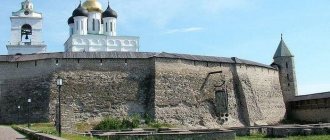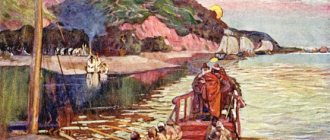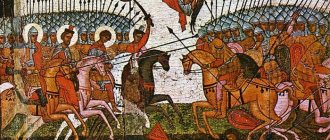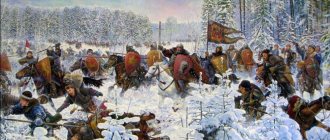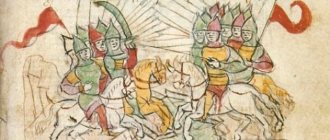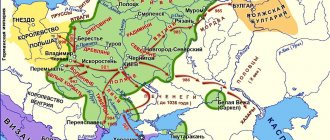Prayers
O holy faithful, Grand Duke Yaroslav, all who lovingly honor you, gracious intercessor and patron! Offer this small prayer of your unworthy servants to the Master Christ, that the living spirit of the Orthodox faith, love, piety, and success in good deeds may be established in His Holy Church; may zeal give the shepherds care for the salvation of people, so as to enlighten the unbelievers, guide those who have gone astray, and convert those who have fallen away; rather, so that all the children of the Orthodox Church will remain pure from worldly temptations, superstition, superstition and the obsessions of the enemy. To her, saint of God, do not despise us who pray to you, but help us with your speedy intercession, so that having escaped all troubles, misfortunes and sorrows in this temporary life, we will find a shameless death and, having lived so well on earth, we will be worthy of heavenly life in heaven, where together with you we will glorify the love of mankind and generosity in the Trinity of the glorified God, the Father and the Son and the Holy Spirit, forever and ever. Amen.
The name Yaroslav in the Saints
This name is recorded twice in the Saints - on March 5 and June 3.
Meaning of the name
The anthroponym Yaroslav is made up of the roots of two words: “yar” - bright, and “slav” - glory, and literally means “bright glory”.
According to another version, “Yar” is the beginning of the name of the Slavic god of the sun and fertility Yarila, and this anthroponym means “glorifies Yarila.” Short and affectionate forms: Slava, Yarik, Yarechka, Rosya, Yarusya, Yaroslavchik. In other languages: Slawek, Jarek, Yarda, Jarko, Jaslav, Jarosz.
Main features
Pragmatism, perseverance, determination, balance, good nature.
Character
Bearers of the name are kind, flexible people and have strong energy. They are always the center of attention and adoration. This anthroponym is involuntarily associated with the image of the legendary Kyiv prince, who went down in history with the nickname Wise, and the Yaroslavs are secretly proud of this fact. This analogy creates daydreaming, imagination and the need for social recognition. As a child, Yarik is a good-natured, cheerful and carefree boy. A little absent-minded, indecisive, but with a wide range of interests. With age, kindness does not disappear, but independence and responsibility are formed, therefore, having become a young man, the namesake of the wise Kyiv prince tries to get rid of guardianship and live independently of his parents. And he succeeds because he has common sense, a sense of humor and quick adaptability.
Slava values freedom and is in no hurry to entangle himself in the bonds of Hymen. However, next to his real soul mate, he transforms into a faithful husband, a loving and caring father.
Negative character traits include vanity, rigidity, and aggressiveness.
Life
Yaroslav the Wise (c. 980 - 1054), Grand Duke of Kiev (1019). Son of Vladimir I Svyatoslavich. He expelled Svyatopolk I the Accursed, fought with his brother Mstislav, divided the state with him (1025), and united it again in 1035. With a series of victories he secured the southern and western borders of Rus'. Established dynastic ties with many European countries. It was under him that the Russian Truth was compiled. Son of the Grand Duke of Kyiv Vladimir I Svyatoslavich and the Polotsk princess Rogneda. Married to the daughter of the Swedish king Olav, Ingigerda. Since ancient Russian sources mention two names of Yaroslav’s wife, Irina and Anna, there is reason to believe that either Ingigerda, who received the name Irina at baptism, was one of Yaroslav’s wives, or Irina-Ingigerda became a nun before her death, taking the monastic name Anna (under this she was canonized by the Russian Orthodox Church as the first princess to take monastic vows before her death). The first period of the life of Yaroslav the Wise was associated with the struggle for the Kiev throne. When Yaroslav reached adulthood, his father made him the prince of Rostov, and around 1013, after the death of Vysheslav (the eldest son of Vladimir Svyatoslavich), Yaroslav became the prince of Novgorod. In 1014, Yaroslav's refusal to pay tribute to Kyiv angered his father and led to the order to prepare for a campaign against Novgorod. But on July 15, 1015, Vladimir Svyatoslavich died suddenly, not having time to carry out his plan. According to the version of events reflected in the Tale of Bygone Years, the Kiev throne was seized by the Turov prince Svyatopolk I the Accursed, half-brother of Yaroslav Vladimirovich. Wanting to eliminate possible rivals, Svyatopolk kills his brothers, the princes of Rostov Boris, Gleb of Murom and Drevlyan Svyatoslav; tries to kill Yaroslav too, but his sister Predslav warns him in time about the danger. According to another version, it was not Svyatopolk, but Yaroslav, who was guilty of the blood of the brothers, which is confirmed by some Western European sources. Having secured the support of the Novgorodians, Yaroslav in December 1015, in the battle of Lyubech, defeated Svyatopolk and captured Kyiv. But Svyatopolk did not accept defeat, and in 1018 he, together with his father-in-law, the Polish king Boleslav the Brave, invaded Rus'. This time, luck favored Svyatopolk, who managed to defeat Yaroslav in the Battle of the Bug and recapture Kyiv. Yaroslav fled to Novgorod, from where he intended to go to Scandinavia. But the Novgorodians cut down the prince's boats and forced Yaroslav to continue the fight. In the Battle of Alta in 1018, Svyatopolk suffered a crushing defeat, and Yaroslav reoccupied Kyiv. After the victory over Svyatopolk, Yaroslav began a fight with his other brother, the Tmutarakan prince Mstislav, who also laid claim to the Kiev throne. In the battle of Listven in 1024, victory was on the side of Mstislav, but he allowed Yaroslav to reign in Kyiv. Nevertheless, Yaroslav did not dare to accept his brother’s offer and continued to remain in Novgorod, sending his mayors to Kyiv. In 1025, according to the peace treaty concluded at Gorodets, Yaroslav received the Russian land to the west of the Dnieper, with the center in Kyiv, and Mstislav received the eastern part, with Chernigov. Only after the death of Mstislav in 1035 did Yaroslav become an autocrat in Rus'. After the Battle of Listven, Yaroslav’s activities were mainly related to the enlightenment and Christianization of Rus'. Perhaps one of the reasons for Yaroslav’s refusal from the prince’s usual military activities was the severe injury he received during the fight with his brothers: an examination of Yaroslav’s remains showed that his leg was severed, which is why the prince had to limp heavily at the end of his life I could hardly cope without outside help. In 1036-37, on his orders, powerful fortifications were built (the city of Yaroslav), the Golden Gate with the Gate Church of the Annunciation, the Church of St. Sofia, and also founded the monasteries of St. George and Irina. The prototypes of these buildings were the architectural structures of Constantinople and Jerusalem; they were intended to symbolize the movement of the center of the Orthodox world to Kyiv. The completion of construction coincided with the creation of the Word of Law and Grace, which was pronounced on March 25, 1038. At the same time, the first Russian chronicle of the so-called. The oldest vault. The Tale of Bygone Years contains a commendable review of Yaroslav’s educational activities. According to the chronicle, the prince took care of translating many Greek books into Russian, which formed the basis of the library he created in the Church of St. Sophia of Kyiv. Yaroslav is also credited with drafting the first Russian legislative act of Russian Truth. In the field of foreign policy, Yaroslav sought to strengthen the international authority of the Old Russian state. On his initiative, the Novgorod prince Vladimir I Yaroslavich launched the last major campaign of Rus' against Byzantium in 1043, but it ended in failure. Around 1050, the first Russian metropolitan, Hilarion, was installed in Kyiv, defending the independence of the Russian diocese from Constantinople. In addition, many of Yaroslav’s children were related by family ties to representatives of the ruling dynasties of Central and Western Europe. Chronicle data regarding the death of Yaroslav are contradictory; It is believed that he died on February 20, 1054, however, many researchers give other dates. Before his death, Yaroslav bequeathed the Kiev throne to the eldest of his surviving sons, the Novgorod prince Izyaslav, ordering his sons to live in peace.
Holy Blessed Prince Yaroslav the Wise
Holy Prince Yaroslav the Wise was born in 978 and was the son of St. Equal-to-the-Apostles Grand Duke Vladimir and Rogneda. Around 1010, he founded the city of Yaroslavl and founded the first church here in honor of the famous ascetic and fighter against paganism - St. Elijah the Prophet. At the site of his victory over the Pechenegs in 1037, Yaroslav founded the majestic St. Sophia Cathedral in the image of Sophia of Constantinople, and in 1045, at his command, his son Vladimir erected the St. Sophia Cathedral in Novgorod. Yaroslav left his memory by compiling a set of laws of Kievan Rus - “Russian Truth”, which, supplemented by his sons and grandson Vladimir Monomakh, became the legal basis for the life of the Russian people. St. devoted a lot of effort. Prince Yaroslav for the Christian education of the people.
The Church prayerfully remembers St. blgv. Grand Duke Yaroslav the Wise on February 20 / March 5 - the day of his blessed death.
The veneration of the blessed prince Yaroslav the Wise, as a locally revered ascetic of piety, began immediately after his repose (1054). The burial itself in the temple (and the relics of the Grand Duke, as is known, rest in the St. Sophia Cathedral) in ancient times testified to the special merits of the deceased before the Church, therefore, memorial services or even prayer services were performed in front of his grave, sometimes permitted by the clergy, so that with the offering of prayers for him to some veneration was paid to him.
HER. Golubinsky, in his famous work “The History of the Canonization of Saints in the Russian Church,” cites the testimony of Adam of Bremen, who in the “Acts of the High Priests of the Hamburg Church,” dating back to 1075, calls Grand Duke Yaroslav Vladimirovich a saint.
Apparently, the invasion of the Mongol-Tatar hordes did not allow the veneration to be brought to its logical conclusion - canonization with the preparation of a service not only for the blessed Prince Yaroslav, but also for many other devotees of piety of the pre-Mongol period. Nevertheless, we find the name of Saint Yaroslav the Wise in all complete catalogs of Russian saints - calendars, which from the beginning of the 17th century were not placed in liturgical books, but were published in special independent publications.
The holy noble prince Yaroslav is commemorated in the lithium prayer “Save, O God, Thy people...” at the service of all the saints who have shone in the Russian land, compiled by the holy confessor Athanasius (Sakharov), Bishop of Kovrov.
“Chronological list of canonized saints, revered devotees of piety and martyrs of the Russian Orthodox Church (IX - mid-XIII century)”, placed in the 2nd volume of the history of the Russian Orthodox Church by Metropolitan Macarius (Bulgakov) and which, according to the publishers, “can be used as a manual for the activities of local and church-wide canonical commissions,” the holy noble prince of Kiev Yaroslav (baptized George) the Wise, classifies “those saints of God about whom it is reliably known that they were not canonized by either the local or church-wide authorities, but who became famous for God-pleasing life... and blessed phenomena and, as a result, were revered by the believing people, and their names were included in various hagiographic monuments.”
In the “Complete Orthodox Theological Encyclopedic Dictionary” published at the beginning of the twentieth century, there is the following article: “Yaroslav - Georgy Vladimirovich, saint, grand duke. Died in 1054. Memory of February 28."
And in the Publication of the Moscow Patriarchate “Theological Works” No. 28 (1987) an icon of the Holy Blessed Grand Duke Yaroslav the Wise was printed.
The Holy Synod of the UOC-MP at its meeting held on March 9, 2004 in the Kiev-Pechersk Lavra, heard a report from the chairman of the Synodal Commission for the Canonization of Saints of the Ukrainian Orthodox Church, Metropolitan Nikodim of Kharkov and Bogodukhovsky and the deputy chairman of the commission, Archbishop of Cherkassy and Kaniv Sophrony, who presented documentary evidence historical sources confirming the fact that the blessed prince Yaroslav the Wise was venerated as a saint in Rus'.
In response to requests from the clergy and lay believers and in connection with the 950th anniversary of the blessed death of Grand Duke Yaroslav, the Holy Synod blessed to include in the calendar of the Ukrainian Orthodox Church and establish a day of remembrance for the holy noble Grand Duke of Kyiv Yaroslav the Wise on the day of his blessed death on February 20, Art. Art. / March 4th Art.
At the same time, it was confirmed that, in accordance with established tradition, the holy noble prince Yaroslav the Wise is considered the heavenly patron of statesmen, lawyers, judges, prosecutors, temple builders, librarians, scientists, teachers and students.
Angel Yaroslav's Day according to the church calendar
Not everyone knows what date the day of the angel of this name is celebrated. All this is due to the fact that it was once July 7th. This day was still called Yarilny. And now it is customary to celebrate name days three times a year, namely:
| date | Patron Saint |
| 5th of March | Yaroslav the Wise, Prince |
| June 3 | Yaroslav (Konstantin) Svyatoslavich of Murom, prince |
| December 8 | Yaroslav Savitsky, martyr, archpriest |
May the Lord protect you!
Watch also the video about the day of memory of Yaroslav the Wise:

